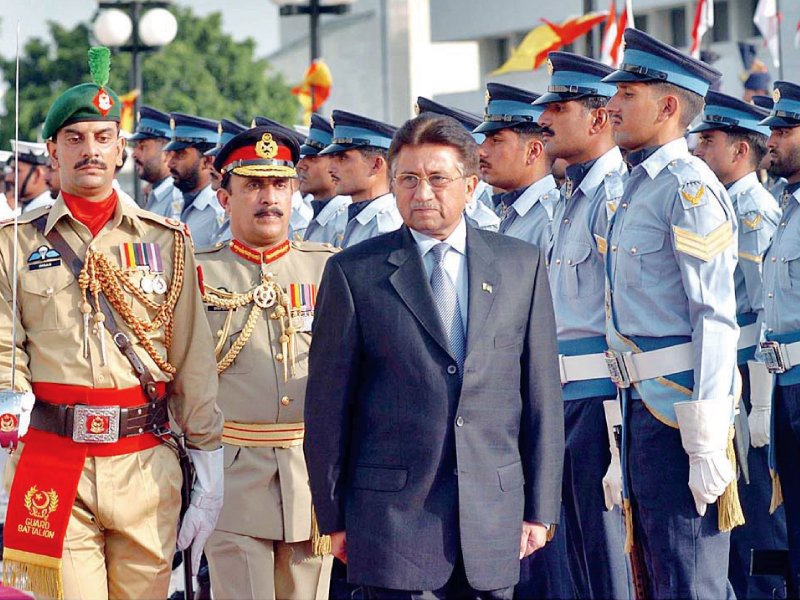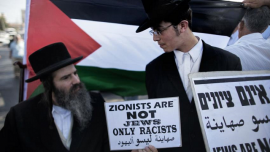
A few days ago, former president Gen (retd) Pervez Musharraf claimed that the army stood with him and was against his trial for treason.
Is that really the case?
To answer this, one needs to recall relations between Musharraf and his former institution since 2007.
First consider the early reports that he had to be urged out of office of the chief of army staff by his own lieutenants, who had suffered a public relations battering following one controversy after another with him in uniform – particularly after the emergency.
Then he continued to sit in the presidency even after the 2008 elections. Eventually, he was faced with impeachment – but the move didn’t materialise despite months of threats by a new government that ought to have moved instantly on the matter. It only picked up steam when Musharraf refused to go.

He ultimately managed to escape the embarrassment of being impeached and stepped out of the presidency unscathed - that too to a guard of honour, which was an achievement in itself given the national mood at the time.
Then he was reluctant to leave the country after stepping down. Once again, it was said that the former commando was unwilling to ‘retreat’ abroad in the face of rising political temperatures and, more importantly, during a phase that the army wanted to rebuild its image. Even a retired officers’ society had taken to targeting Musharraf. And then there were the cases.
He eventually managed to fly abroad without any hue and cry or before any of the cases materialised.
But, other than the first few months, it was not a life of quiet retirement, like all other retired army chiefs. He formed a political party and periodically threatened to return – reminding everyone of a lot of things.
Meanwhile, during his absence, the army had retreated to the barracks. They were headed by a man that was his polar opposite. Many had termed Kayani the quiet general, a man known for his professionalism. He gave speeches about the army’s support for democracy and the need to learn from and not repeat past mistakes. The continued influence that Pindi exercised in Islamabad was quiet and unassuming at most times.
As the rebuilding job continued, many say that the Army had to continue to plead with the former general to stay put in London every time he promised to return.
He had a cozy pad in the UK, and lots of friends visiting. He went on well-paid lecture tours and attended the odd pheasant hunt. He even had security protocol – first from Pakistan and then from the UK’s security services. There were cases against him at home, but no one was pushing for him to be “extradited” – not even an activist judiciary. It was the life most retirees dream of.
But evidently not Musharraf.
He surprised everyone by returning just before the May 2013 elections. Given history, this return was not only that of an individual, but of a spectre rising from the dead for the Army – a spectre that it had effectively done a great job of exorcising in the five years following his departure.
Suddenly the cases reopened upon his return. Benazir’s assassination. Bugti’s assassination. The Lal Masjid Operation. There would be court appearances, charge-sheets and questioning by IOs – surely embarrassing ones for his former institution. Despite his periodic cameos, the army had just completed a painful rebuilding job.
Yet again there was intervention. Instead of a dingy prison/detention cell, the former chief would be ‘held’ at his plush farmhouse in Chak Shehzad. Bails came easily – one after another. The coast was clear. Now’s the time, sir. But he insisted he wanted to face all the cases.
Time continued to slip by.
Then it happened after much delay: The mother of all cases, the most obvious one, the trial concerning his usurping of power, would begin. The government had threatened, but dithered; they gave him time. They gave the army time. The lead-up period had many murmurs of behind-the-scenes urging. It seemed to have little effect.
Eventually matters could not have moved this far without some sort of nod, a frustrated shrug, from Pindi.
With the walls closing in on him, Musharraf has ‘fallen ill’ and the case seems to have come to a grinding halt. The exit has opened up once again, and the light is green.
If and when he exits the country, Musharraf will probably have realised something about all these favours.
His statement that the army was not happy with his trial is in so many ways true. Perhaps it has finally dawned on him that the unhappiness was clearly not with the civilian government or the judiciary.
Published in The Express Tribune, January 3rd, 2014.
______________________________________________________________
[poll id="1283"]
COMMENTS (8)
Comments are moderated and generally will be posted if they are on-topic and not abusive.
For more information, please see our Comments FAQ

















Musharraf should be tried for subversion of the constitution along with the Judge who took oath under him and then allowed him to subvert constitution by signing Legal Framework Order
@Muslim Leaguer: No judge was arrested "along with their families". I saw the same videos that you refer to and the judges were detained in their own homes, that is, they were not allowed to leave their homes for a few days. Secondly, the judiciary is not above the executive and the parliament, it is equal and cannot pass judgements that get in the way of the running of the government. The judicial overreach is the reason that emergency was declared which is well within the right of the executive branch when it pertains to issues of national security (the judiciary was letting lose all terrorists arrested in military and law enforcement operations and these very same people were launching attacks on the military and police officers). This should be understood clearly. Anytime the national security is threatened, the executive has the right, validated by parliament which it was then, to impose a state of emergency and put curbs on those considered to be posing a problem to the security of the state. In this case, this turned out to be the overly activist and overreaching judiciary.
People get the rulers they deserve and in Pakistan case it is absolutely true. Our people hate lawful environment and liked to be kicked from behind and this is what PPP and now PML N has given them. I have no sympathy for such people even if it hurts me and my family. The only periods that saw prosperity all the way down were not of this trash called PPP,Nawaz League etc. Read the history. These 'well-wishers' of our people want to ensure that no one is left to come to the rescue and this loot and plunder continues.
This nation deserves thieves and looters. I hope feudal democracy continues and ppl suffer from hunger, rising prices.. lawlessness.. terrorism.. This nation deserves a less..even if they beg musharraf to return he should spit on their direction. Musharraf deserves a better country.. We are disgrace to this world.
@Muslim Leaguer: and how does any of these things affect common man? Here the thing is Musharaf is loved by people without power and hated by the powerful. All I know is his was a time of stability and progress, this so called democracy does not represent common man and it never will
@Muslim Leaguer It was Musharraf who had given this freedom to Media only if you have forgotten this fact. And it is on record the way media abused this freedom over a period of time. Musharraf has a long list of goods opposed to the so-called democratic governments who have played havoc with the life of a common Pakistani. Musharraf has given a lot to the common man of Pakistan if not anything to the power savvy people of Pakistan.
The acts including curbs on media, installing of PCO judges and arresting of 60 judges of superior judiciary along with their families were watched by the entire world and the confession of these acts was shown live by TV Channels on 3rd November 2007. Article-6 of the Constitution prescribes punishment for subversion of the Constitution. Everyone should learn to respect the rule of law!
A totally biased article as always by ET against a leader who saved Pakistan from looters. Since his departure people are crying and some suffering from hunger. This is what the democracy and the so called independent judiciary has given to us. Long live Musharraf.